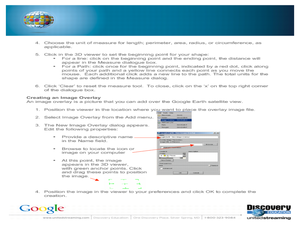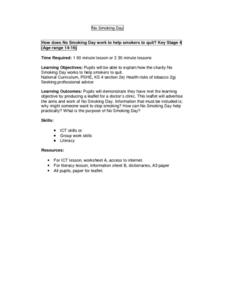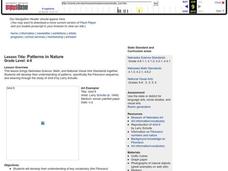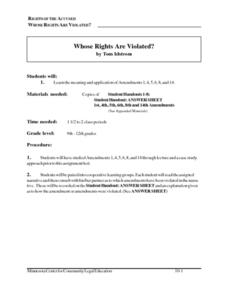Curated OER
Discover the History of Melody
Students connect to music resources. For this music lesson, students visit the websites of the Handel House Museum, the Horniman Museum, Reid Concert Hall, and the National Center for Early Music. Students may research the virtual music...
Curated OER
Thanksgiving Slide Show
Second graders produce a simple piece of writing given the topic sentence: "I am thankful for..." . Students translate their piece of writing into an electronic format using the software program KidPix. Students present their completed...
Curated OER
Great Explorers
Young scholars research an explorer and present a multimedia presentation on the explorer. For this United States explorers lesson, students watch a video about Lewis and Clark. Young scholars use Google Earth to study their journey and...
Curated OER
You, Me and UV
Students explore the validity of claims of UV protection. Students research UV rays and the cancer danger presented by these rays. Working in groups, they perform tests on sunglass and sunscreen products to determine if their claim of UV...
Curated OER
Cloning and Related Issues
Eighth graders research information on cloning and the surrounding issues online. They analyze the issues surrounding cloning and present their point of view with supporting details in a Powerpoint presentation.
Curated OER
How Does No Smoking Day Work to Help Smokers to Quit?
Learners explore how to help smokers quit on No Smoking Day. They create a mind map addressing the issues including what No Smoking Day is, what does the charity do, what help is available, and what the No Smoking Day achieves. After...
Curated OER
Lucy's Literacy Legacy
students examine three local public arts portraits of Lucy Stone. They study her role in the women's rights movement through comparative readings, Internet research, and children's literature. In addition, they gather and organize...
Curated OER
ourney Through Time: Art Tells the History of Nebraska
Fourth graders discuss early Nebraskan history. They view and discuss the painting "Sodhouse Family." Students are directed to the artistic elements of the painting, such as the horizon line. They follow a prescribed procedure to create...
Curated OER
Documenting Where We Are
Students contribute to discussions and identify how an artist elicits a viewer's response. They use William Henry Jackson's Pawnee Indian Village, photograph and painting. After analyzing this information, students use information gained...
Curated OER
Patterns in Nature
Young scholars learn about artist Larry Schulte and view examples of his work. They create addition sentence for the first seven numbers of the fibonacci sequence and use unifix cubes to build that sentences. Students color and create...
Curated OER
Son of a Gamblin' Man: The Life and Art of Robert Henri
Students bring baby pictures of themselves. They discuss composition in art and compare these to their pictures. Students discuss mood, and ways an artist creates mood. They create a triptych using their baby picture, a recent photograph...
Curated OER
Oregon Trail Art
Students describe events that happened on the Oregon Trail and in the daily lives of Native Americans by writing a narrative essay of a family traveling through Nebraska based on Thomas Hart Benton's paintings.
Curated OER
Beauty of the Harvest
Students collect information from Beauty of the Harvest and Native American culture to determine what women accomplished in their daily lives. After organizing and thoughtfully considering this information, students create their own...
Foreign Policy Research Institute
A Geography Lesson
Fewer and fewer people have a strong grasp of world geography, but this activity helps students understand geopolitics by creating their own original historical map. The activity requires selecting a country from the list provided,...
Curated OER
The Bernstein Bear's Trouble with Money: Financial and Academic Literacy
What do figures of speech have to do with financial literacy? Take an interdisciplinary look at The Berenstain Bears' Trouble with Money to find out. Young analysts read about the cubs' spendthrift ways and how Mama and Papa Bear teach...
Curated OER
Philanthropic Literature: Quilt to Freedom
A reading of Sweet Clara and the Freedom Quilt by Deborah Hopkinson launches this study of slavery, freedom, and the Underground Railroad. After a discussion of the importance of showing respect for others and of helping each other in...
Curated OER
Stories of the American Experience
Students identify a veteran to interview. This could be a family member of one of students or someone contacted through an organization in the community. They use a storyboard to plan their movie about their subject.
Curated OER
Panda-Monium!
Students compare and contrast two species' characteristics. They then complete a Venn Diagram and practice web browser navigation skills, including moving from one window to another.
Curated OER
This Land Is Our Land
Learners research federal land holdings. They explore how those lands are used. They map these lands and design their own legends. They discuss whether or not the land is being used accordingly.
Curated OER
Studying Oral Histories
Young scholars read stories from the 1930s and 1940s. They discuss homelife during World War II. students examine changes in lifestyle and technology that may take place in the future.
Curated OER
Watershed Documentary
Students conduct research and collect data about a local watershed area. They create an iMovie showing the human and natural impacts on the creek and watershed areas.
Curated OER
Whose Rights Are Violated?
Learners examine the 1st, 4th, 5th, 6th, 8th and 14th Amendments to the Constitution. They work with a partner to determine which amendment has been violated while working on a worksheet.
Curated OER
Volunteering For Others
Students research the kind of volunteer options for teens in their area. They estimate the number of teens who do volunteer by conducting a simple survey. Students display findings in a paper and in charts.
Curated OER
Protecting your home from carbon monoxide
Students create and distribute flyers, mailings, posters in public areas to help make people aware of how to protect yourself from carbon monoxide. Students research what carbon monoxide is and what can be done to protect those in the...




